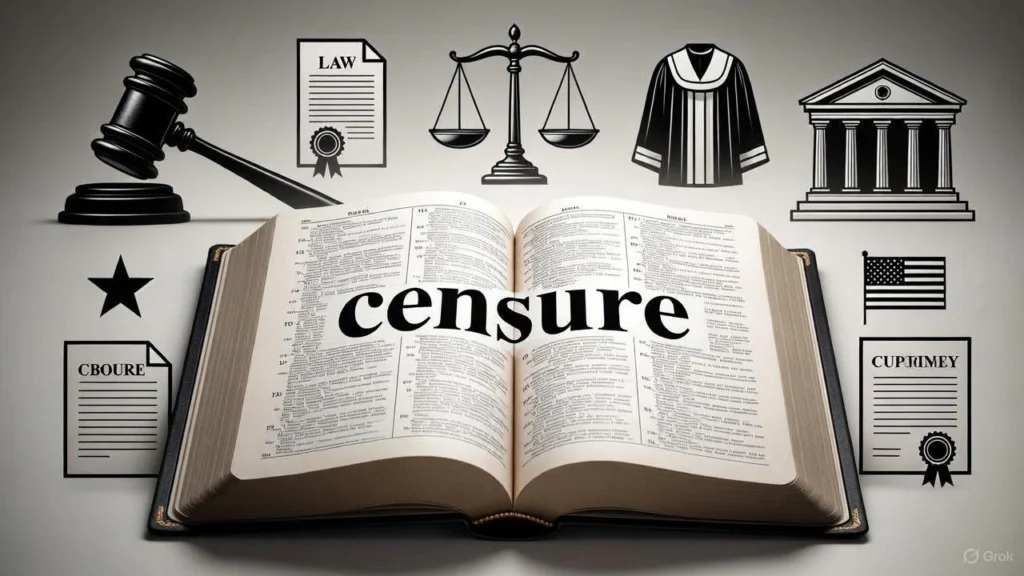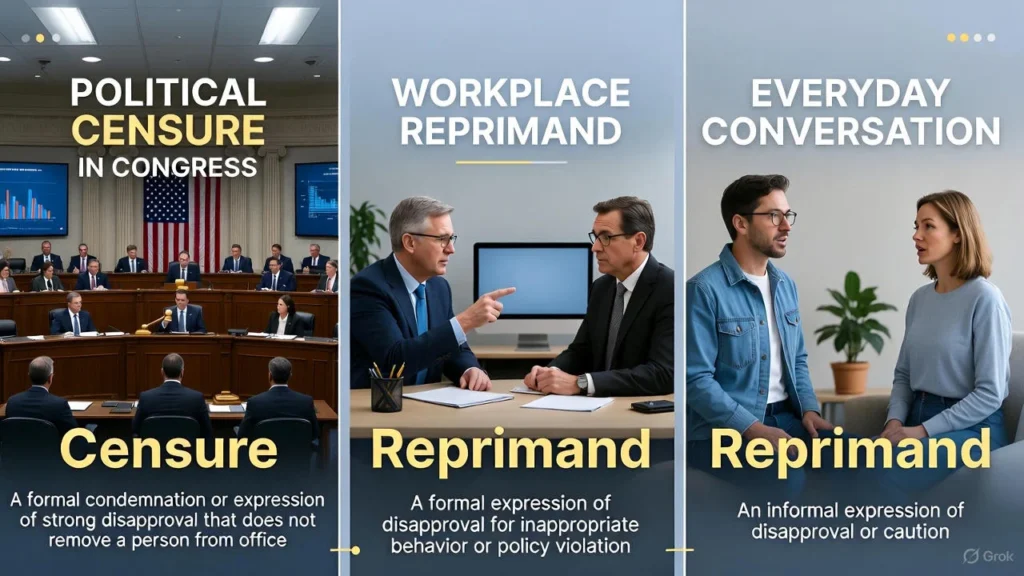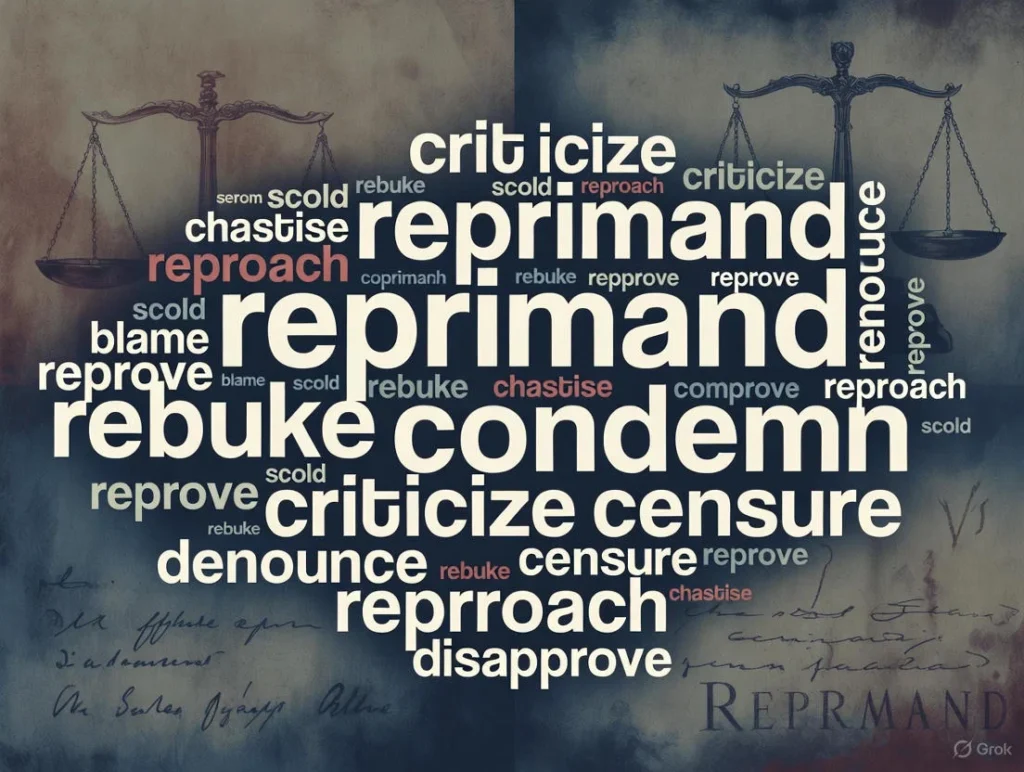Censure means a formal public statement of disapproval — especially used in government, Congress, and politics to punish misconduct without removing someone from office.
Now let’s break it down properly.
If you’ve ever searched “what does censure mean,” “what does censure mean in government,” or “what does censure mean in Congress,” you’ve likely noticed that explanations can be vague or overly complicated.
In political news, phrases like “a House censure,” “a congressional censure,” or even “What does censure mean for Al Green?” appear frequently — but most people still don’t know what a censure actually does.
This article gives you a clear, human-friendly, easy explanation of the word censure, its meaning in politics, how it works in the House of Representatives, what happens during a congressional censure, and why it matters. You’ll also learn its origins, usage, misconceptions, examples, and FAQs — everything in one simple guide.
What Does Censure Mean? (Definition & Meaning)

At its simplest, censure means to strongly criticize, condemn, or express formal disapproval. While people sometimes use it casually to mean “scold,” the word becomes far more serious in political contexts.
General Meaning
- A strong, official statement of criticism
- A public reprimand
- An action that carries symbolic punishment
In Politics, Government & Congress
When people ask “What does censure mean in politics?” or “What does a censure mean in Congress?”, the answer is:
👉 It is a formal vote of disapproval by a legislative body (like Congress or the House of Representatives) against a member who broke rules, acted unethically, or behaved improperly.
It does not remove them from office — it simply shames them publicly.
Common Variations People Search
- what does censure mean in government
- what does house censure mean
- what does censure mean in the House of Representatives
- what does congress censure mean
All mean the same thing: a public condemnation without removal from office.
Origins & History of the Word “Censure”

The word censure comes from the Latin censura, meaning judgment, assessment, or correction. Historically, it was used to describe actions taken by Roman censors — officials responsible for maintaining public morals and conduct.
Over Time
- Middle Ages: Used for church penalties and moral discipline
- 16th century onward: Shifted to mean formal criticism
- Modern politics: Used as a non-removal punishment tool
Today, it remains a powerful symbolic tool in U.S. politics, especially when someone asks:
“What does a congressional censure mean?”
Usage in Different Contexts

1. Government & Politics
This is the most common modern use.
How It Works
A chamber like:
- Congress
- House of Representatives
- State legislatures
can vote to censure a member publicly.
During the vote, the person must often stand in the well of the House while their misconduct is read aloud. This creates public humiliation — exactly why people ask:
“What does a censure mean for Al Green?” or any other politician in the news.
What It Does
- Public embarrassment
- Permanent record of misconduct
- Loss of political influence
What It Does NOT Do
- It does not remove someone from office
- It does not strip voting power
- It does not cause automatic legal penalties
2. Social & Professional Context
Outside politics, censure means:
- Strong criticism
- Official workplace reprimand
- Formal written warning
Example:
“His unethical behavior earned him a formal censure from the board.”
3. Everyday English
People may use it to mean:
- Criticizing someone
- Calling someone out
- Expressing disapproval
Though most everyday use is much lighter than political censure.
Common Misunderstandings & Clarifications

1. Does censure mean removal from office?
❌ No — that’s expulsion.
Censure = disapproval
Expulsion = removal
2. Does censure carry legal punishment?
❌ No — it’s symbolic, not legal.
3. Is a censured member still allowed to vote?
✅ Yes, they retain all voting rights.
4. Is censure the same as impeachment?
❌ No.
Impeachment is a formal charge.
Censure is a public scolding.
5. Does censure harm a political career?
✔ Often yes — it damages reputation permanently.
Alternatives & Synonyms

- Reprimand
- Condemn
- Rebuke
- Scold
- Criticize
- Reproach
- Reprimand
- Call out
- Public warning
In political language:
- “Formal reprimand”
- “Official condemnation”
Frequently Asked Questions (FAQ)
1. What does the word censure mean?
It means formal, public disapproval or criticism.
2. What does censure mean in Congress?
It’s a public vote condemning a member’s misconduct.
3. What does a House censure mean?
The House of Representatives votes to publicly reprimand a member.
4. What does censure mean in the government?
A symbolic punishment expressing disapproval of a government official.
5. Does censure mean kill or remove from office?
No — censure is symbolic; it doesn’t remove anyone.
6. Why do people ask “What does censure mean for Al Green?”
Because specific politicians face censure votes, and people want to know the consequences.
7. Is censure worse than a warning?
Yes — it is an official, public condemnation.
Conclusion
The word censure might seem complicated, but its core meaning is simple: a formal public statement of strong disapproval.
If you’ve seen searches like “what does censure mean in Congress,” “what does censure mean in government,” or “what does a House censure mean,” they all point to the same thing — a symbolic punishment meant to publicly shame an elected official without removing them from office.
Censure has deep historical roots, powerful political impact, and lasting reputational consequences. While it doesn’t carry legal penalties, it sends a clear message: a member’s actions are unacceptable. Understanding what censure means helps you follow political news, congressional actions, and debates with clarity.
If in government, workplaces, or everyday language, the term remains a strong expression of criticism, accountability, and public judgment.




